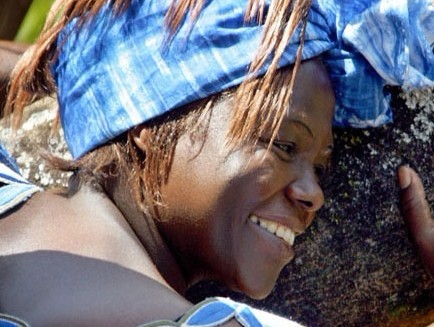(单词翻译:单击)
Wangari Maathai
旺加里·马塔伊
Wangari Maathai, Kenyan environmentalist and political activist, died on September 25th, aged 71.
旺加里·马塔伊,肯尼亚环保专家,活跃的政治家,于九月二十五日逝世,享年71岁。
In many ways it seems odd that Wangari Maathai’s life should have been so closely associated with struggle. Success appeared to come almost effortlessly to her, even though her origins were humble. She was born to a Kikuyu family of peasant farmers in Ihithe, a small village in the central highlands of Kenya, which was then a British colony. Though it was far from common in the 1940s for girls like her to receive an education, Wangari was sent to primary school—at her brother’s suggestion—at the age of eight. From then on accomplishments seemed to drop into her lap. She got to secondary school, graduated top of her class and went on to earn a degree in biology in Kansas, an MSc in Pittsburgh and, after studying in Germany, a PhD on gonads in bovines in Nairobi. That made her the first woman in east Africa to hold a doctorate. Jobs followed, in academic and civic positions which no black woman had filled before, and on their heels came award after award, none grander than the 2004 Nobel peace prize.
旺加里·马塔伊的人生怎会如此紧密地与斗争相联系,不可谓不怪。因为尽管出身微寒,成功于她唾手可得。她生于肯尼亚中部高原一个名叫伊希特(Ihithe)的小村庄,出身基库尤农民家庭,当时肯尼亚还是英国的殖民地。在二十世纪四十年代,像她这样的非洲女孩多半没机会受教育,马塔伊却很幸运,在哥哥的建议下,家里让她在八岁进了小学。从此各样成就纷纷收入囊中,她进了中学,并以全班第一的成绩毕业,后来留学美国在堪萨斯获得生物学学士学位,在匹兹堡获得理学硕士学位,又赴德国学习,然后回到肯尼亚,在首都内罗比获博士学位,研究方向为牛科动物生殖腺研究。这样,她成了东非第一个女博士,获得黑人女性未曾有过的学术与行政职位,接踵而来的是一项又一项荣誉与奖励,最为荣耀的是在2004年获得诺贝尔和平奖。
In truth, these successes were not effortlessly achieved. Dr Maathai laboured hard all her life, never taking shortcuts, never adopting airs, never asking others to do tasks she would not do herself. And with this conscientiousness and lack of self-importance came another quality, a keen ability to empathise with others and fight their corner when she believed they were being wronged. Most of the struggles with which her life was associated were not her struggles; they were other people’s.
诚然,成功背后,她付出了很多。马塔伊博士一生辛勤工作,从不走捷径,已所不欲勿加于人。她做事尽职尽责,从不认为自己有多了不起,同时又有路见不平拨刀相助的侠气。她的一生是斗争的一生,然而其中大部分的斗争本来都和她没什么关系,她是为他人而战。
And, boy, were there lots of them. Colonial Kenya was hardly idyllic for Africans. Towns were de facto segregated and blacks had few political rights, especially during the Mau Mau rebellion in the early 1950s, when both sides committed hideous atrocities. Moreover, although Dr Maathai’s father worked for a benign white landowner, he was obliged to sell to his employer almost all the crops he grew on his allotted patch at whatever price was offered.
可是若她有路见不平拨刀相助的侠气,这一路上却有太多的不平。作为殖民地的肯尼亚并不是非洲人的乐土,各个城镇实际上被隔离,黑人几乎没有政治权力,尤其在二十世纪五十年代茅茅党叛乱的时候,英方与叛乱方都种下滔天罪行。此外,尽管马塔伊的父亲耕种的土地属于一个比较善良的白人地主,定价权毕竟在地主手上,他种出的粮食,几乎所有的都要卖给地主。
Laurels, but not for resting on
荣誉的月桂树,却并不供人休憩
When Dr Maathai came home after half a decade in America, she found huge changes. They were not all for the better. Kenya had gained its independence just two years before, and political power was now in the hands of Africans, but new forms of discrimination had appeared. Tribalism, reinforced by sexism, was her first antagonist: the job promised to her in an official letter of appointment as a research assistant to the professor of zoology at the University College of Nairobi had been withdrawn. It was given instead to a man, still in Canada, of the same tribe as the professor. She had to find another job.
马塔伊在美国求学六年之后,回到肯尼亚,此时祖国已经发生了巨大的变化。境况并未变好,尽管肯尼亚已在两年前独立了,政治权力现在在非洲人手上,可是新的歧视却已产生。她遇到的第一个对手就是部落歧视加性别歧视:官方曾委任她做内罗比大学一名动物学教授的研究助理,可是又被取消了,因这一职位给了还在加拿大的一名肯尼亚男性,他与该教授是同一个部落的。马塔伊只得另谋它职。
Another change soon started to concern her. All her life she had had a kinship with the land, helping to make the mud plaster for the walls of the family house, tilling the fields with her mother and delighting in wet soil which, “when you rubbed it between your fingers you could almost feel the life it held”. She was drawn to water, too, especially, as a child, to the clear, clean water that gushed from an underground stream called Kanungu, close to a sacred fig tree.
接着,肯尼亚大地上发生了许多让她为之忧虑的变化。马塔伊一生亲近土地,家里做房子,她帮忙和泥浆砌墙,家里的地板是她和母亲一起铺好的,她喜欢玩湿软的泥土,“手指与泥土相摩擦,几乎能感知到泥土的生命。”又好水,孩提时,总被卡努恩姑涌过的清澈水流吸引,那是一条地下河,边上有株圣洁的无花果树。
But even before she went abroad, pressure on the land was increasing. On her return, many of her favourite places had been dug up, the wild trees cleared in favour of tea or coffee plantations, and local plants and animals had disappeared. Land, and therefore food, were scarce, logging was causing erosion and villagers had to walk ever farther to find firewood: this, not the shortage of petrol, was for many Kenyans the real energy crisis.
环境的压力在她出国之前已经在步步增加。回国之时,昔日她最爱的地方多被开垦,原始森林被清理了,用来种植茶叶和咖啡,乡土植物和动物消失了。土地稀缺,粮食紧张,大量伐木导致水土流失加剧。村民要砍柴得走很远很远的路,这是肯尼亚人民的能源危机,是肯尼亚人民的“石油短缺”。
No wonder Dr Maathai found herself on a collision course with Kenya’s new masters, especially the members of the crony-ridden and corrupt court of President Daniel arap Moi. Setting aside her academic career, she found herself drawn into civic causes, feminist campaigns and politics, both at her husband’s side (he became a member of parliament) and in her own right (she too eventually won a seat and in 2003 was made a junior minister).
难怪马塔伊博士与肯尼亚新政府、尤其与丹尼尔·阿拉普莫伊总统唯亲是任、腐败滋生的朝廷格格不入。她放下学术,一心为公民的利益,为妇女权利运动,为政治运动斗争。其丈夫是国会议员,自己也在2003年最终获得国会一席职位,成了新近大臣。
As ever, she had her triumphs. Against the odds, she prevented a 60-storey skyscraper from being built in a park in central Nairobi. It had been designed to house, among other things, the headquarters of President Moi’s party. And she succeeded, at least for a while, in stopping the government from handing out parcels of public land to reward its supporters. That followed her attempt to plant a tree on forested land earmarked for a golf course.
她一如既往地收获胜利。成功地阻止了内罗比中心一个公园里建六十层摩天大楼的计划,本来计划阿拉普莫伊总统所在政党的办公总部就要设在该摩天大楼内。她在一块指定用来建设高尔夫球场的荒木林地上植下树木。而且,至少暂时地阻止了政府将大片公共土地分发给政府支持者。
In this episode, as in others, she and fellow-protesters were beaten by the police. She was also arrested with some regularity, particularly when her Green Belt Movement tried to hold protests. Yet that movement, by concentrating most of its efforts on planting trees (30m or 40m in Africa so far), had enormous popular support. And from this Dr Maathai, no matter how much she was frustrated by the courts, the bureaucracy and the political establishment, drew her strength.
马塔伊博士,和她身边的抗议者常遭警察毒打,也经常被捕入狱,尤其在城市绿化带运动各次抗议中总是被捕。城市绿化带运动致力于植树造林工作,目前在非洲种下三到四千万株树木,赢得了广泛的支持。因此,无论法院、官方和政府如何为难马塔伊,她总有力量。
Many Kenyan men, including her husband, who divorced her, found her too strong a character. She certainly had courage galore, as well as the gift of impressing foreigners, who often rallied to her in times of need. But she remained close to her Kenyan base, especially the women among them, and surely did more good for Kenya than all the men together who found her principled politics so unsettling.
许多肯尼亚男人,包括与她离了婚的丈夫,都认为她太强势了。当然,她有着非凡的勇气,总能给外国人留下很深的印象,在她需要的时候外国人总是支持她。可是她与肯尼亚大地、尤其是和肯尼亚妇女,紧密地联系在一起,那些男人们为她富有原则的政治感到不安,可是她对肯尼亚的功劳,比他们所有人加起来还要多。


